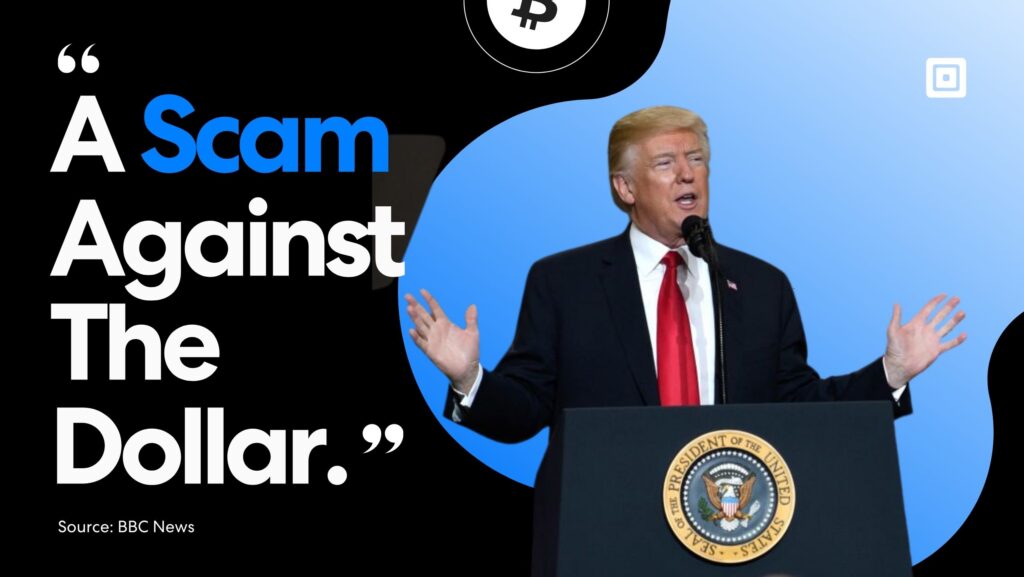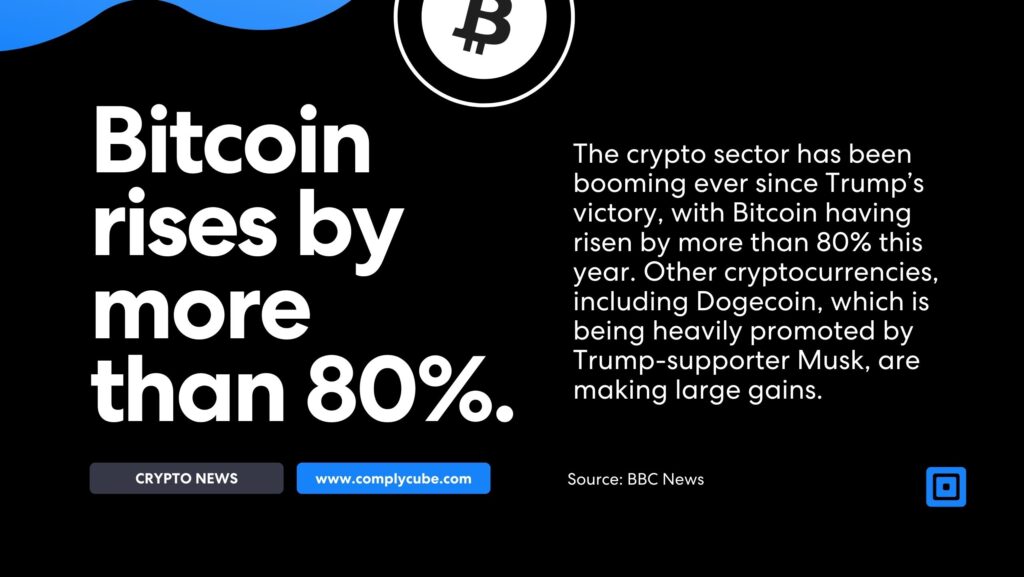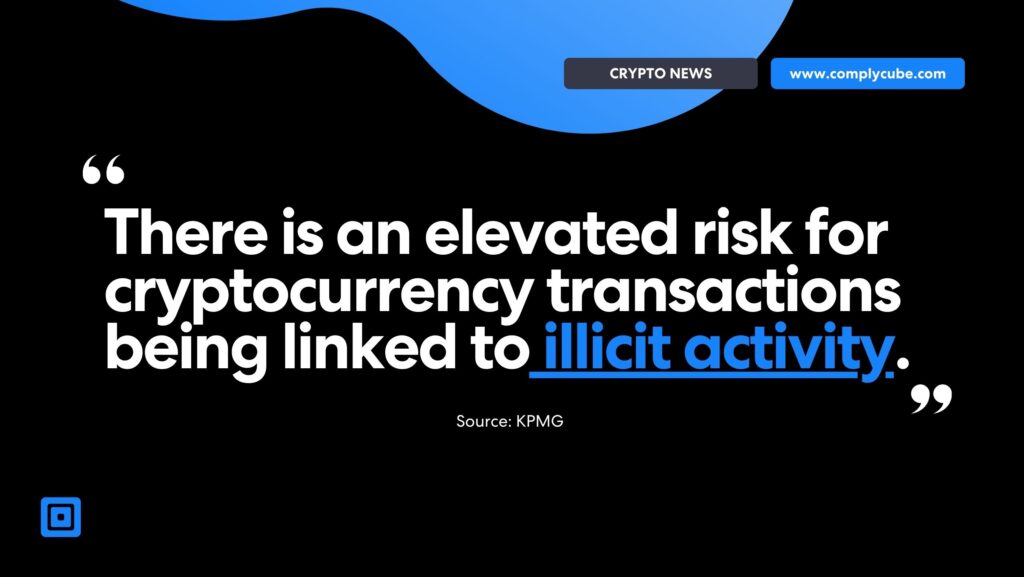Trump’s recent victory has marked a key turning point within the global crypto market, with the price of Bitcoin surging above $80,000 for the first time in history. The president-elect pledged that if elected, he would make the US the “crypto capital of the planet,” easing crypto regulations to foster growth and innovation. What remains to be decided is whether this is an example of practical, forward-thinking economic policy anchored on hedging against inflation and promoting global liquidity or a last-minute scramble to win over corporate America, which will ultimately lead to not just a bullish Bitcoin market but a bullish crypto fraud one too.
Conveniently Forgetting Trump’s Crypto Skepticism
Trump famously called Bitcoin “a scam against the dollar,” which seems to have been conveniently forgotten by what is supposedly soon be “the crypto capital of the planet.” Funnily enough, that very line may ring a bell – it’s remarkably similar to Trump’s 2021 pledge that the dollar would be “the currency of the world.”

Back then, Trump blamed the rise of ‘scams’ like Bitcoin on figures such as Elon Musk. According to Trump, Musk was ‘behaving stupidly’ by encouraging public belief in the authenticity of these cryptocurrencies.
A scam against the dollar.
This prior context, which seems to have disappeared from our newsfeeds, certainly makes current headlines seem somewhat laughable, with Musk now continuing his “stupid behaviour” in a government entity named after a cryptocurrency. Of course, flip-flopping is common amongst politicians, but this points to a lack of real conviction from the president-elect, suggesting he may very well have decided to align himself with the crypto sector to ensure an easier win.
What Does This Mean For Crypto?
The crypto sector has been booming ever since Trump’s victory, with Bitcoin having risen by more than 80% this year. Other cryptocurrencies, including Dogecoin, which is being heavily promoted by Trump-supporter Musk, are making large gains.

In the run-up to his election, Trump stated that he would stockpile bitcoin and sack Gary Gensler, the current chair of the Securities and Exchange Commission (SEC). Gensler has been a key part of the crypto crackdown that has taken place under Biden. Matt Simpson, Market Analyst at StoneX Financial, stated to the BBC that, “If the Trump administration does deregulate crypto, it’s hard to see how it is not bullish for the sector.”
If the Trump administration does deregulate crypto, it’s hard to see how it is not bullish for the sector.
The Biden administration, of which Harris is Vice President, has carried out a period of increasing regulation and cracking down on fraud in the crypto sector. Some recent examples include:
- In March, FTX founder Sam Bankman-Fried was sentenced to 25 years in prison for fraud after misappropriating billions of dollars from customers worldwide, leaving many still attempting to recover their funds.
- The following month, Changpeng Zhao, founder of Binance—the largest cryptocurrency exchange globally—received a four-month prison sentence. Binance also faced a $4.3 billion (£3.2 billion) fine after Zhao admitted to enabling money laundering on the platform, including transactions linked to criminals, child exploitation, and terrorism. The U.S. Department of Justice addressed the case.
Trump’s newfound enthusiasm for crypto puts him in a position to undo much of the recent regulatory progress. This could potentially create a breeding ground for money laundering practices, terrorist financing, and more. However, with international entities such as the Financial Action Task Force (FATF) watching from afar, the rule book cannot be thrown completely out the window.
The Current Landscape of Crypto Fraud
Americans lost close to $6Bn last year to investment scams, most of which were carried out within the digital walls of crypto platforms. Several high-profile cases over the past year, such as Binance’s $4.3 dollar fine in November 2023, have demonstrated a lack of internal governance within crypto exchanges.
The FATF only began regulating the crypto sector in 2018 – 2019, at which point crypto was still a buzzword without stabilisers. Yet, as its threat became clear, the FATF imposed new legislation, such as the Crypto Travel Rule.

Crypto regulation has since slowly tightened, bringing the sector in line with finance and banking. However, even with said regulation, the crypto sector is still by far the most fraudulent, signaling a need for increased vigilance rather than the government taking its hands off the wheel.
There is an elevated risk for cryptocurrency transactions being linked to illicit activity.
Numerous well-known publications and organizations have voiced their concerns regarding the industry’s fraudulent practices, with CBS News reporting earlier this year that “Cryptocurrency is an unregulated investment space that federal regulators and consumer advocates have long said makes it ripe for fraud. Crypto investors have reported losing billions of dollars due to hacks or scams.” This is a worrying thought – a sector that was already bubbling up with fraud might now lose some of the regulatory frameworks that were offering needed protections.
What Should Crypto Exchanges and Businesses Do?
Crypto-related businesses should be fully aware of the reputational and financial damage that fraud within their platform poses. Just because regulatory pressures may be somewhat alleviated does not mean that they should not continue to protect their platform to the very best of their ability.
Investing in the best defenses for fraud includes keeping KYC processes up-to-scratch with technologies such as biometric liveness detection for identity verification that can detect sophisticated presentation attacks. Including a wide range of AML checks, including sanctions and PEP screening, adverse media checks, multi-bureau checks, and more, can also prevent bad actors from gaining access to their platform, drastically reducing the risk of fraud and scams.
ComplyCube works closely with several businesses within the crypto sector, helping ensure their platform stays fraud-free and compliant at all times. For more information on how to safeguard your crypto business, get in touch with one of their compliance experts.




